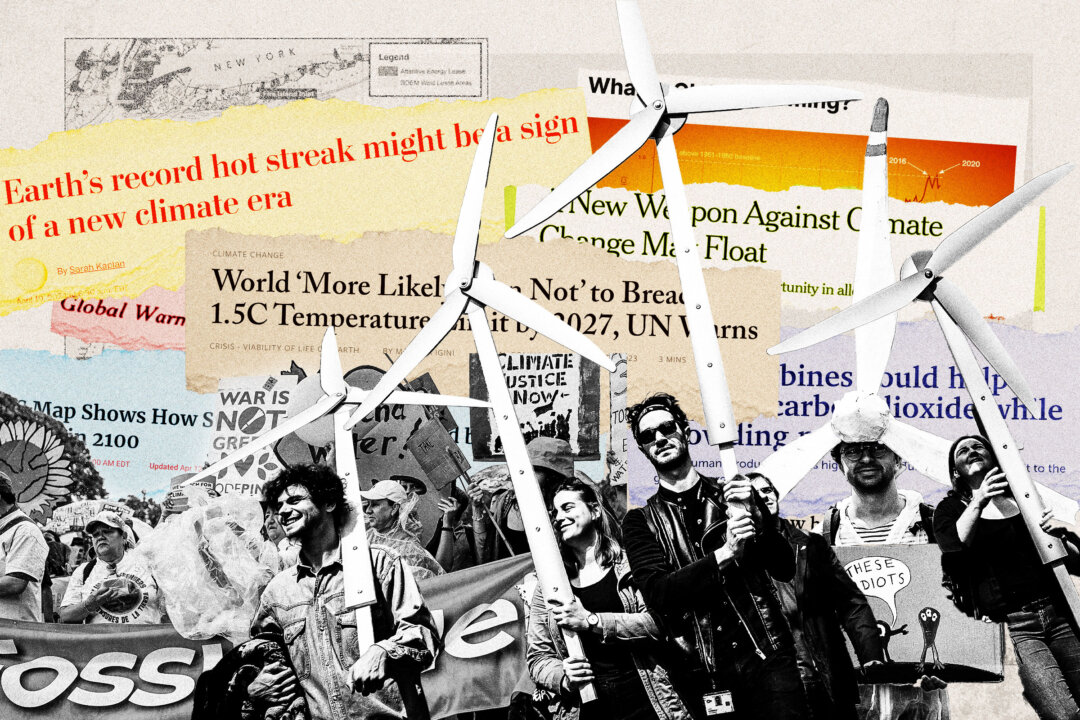Mr. Machogu said the IMF and the Western nations that embrace climate policies for Africa are engaging in neocolonialism, or “climate colonialism.”
And it’s no different than past colonialism, the likes of which liberal elites, such as former President Barack Obama, have condemned.
“Colonialism skewed Africa’s economy and robbed people of their capacity to shape their own destiny,” President Obama said while in Ethiopia in 2015. “Eventually, liberation movements grew. And 50 years ago, in a great burst of self-determination, Africans rejoiced as foreign flags came down and your national flags went up.”
Two years earlier, in 2013, while in South Africa, President Obama warned a group of young African leaders about the consequences of Africa achieving Western parity.
“If everybody’s raising living standards to the point where everybody’s got a car, and everybody’s got air conditioning, everybody’s got a big house, well, the planet will boil over,” he said, “unless we find new ways of producing energy.”
The new climate colonialism is being driven by global entities such as the U.N., which says Africa should have energy, but due to climate change concerns, it should focus on wind and solar.
Calvin Beisner, founder and president of the Christian-based Cornwall Alliance, said currently “the most harmful policy” is that the IMF, World Bank, and agencies such as the U.S. Agency for International Development “refuse to do loans or other funding for coal, natural gas, or oil-based electric generating stations in sub-Saharan Africa and parts of Asia and Latin America.”
[clip]
Climate Colonialism
Mr. Machogu criticized the U.N.’s 2023 Sustainable Development Goals for Africa, which he said were developed after U.N. employees went to Africa to study the issues facing the continent. From that expedition, U.N. employees came up with 17 “solutions.”
“They said that one of the problems is climate change,” Mr. Machogu said. “It doesn’t make sense to me because I come from Africa. We have far bigger problems—people sleeping hungry, very poor people around me. I’m more worried about that than I'll ever be worried about climate change.
“Every solution to [Africa’s] problems is centered around climate change. [The UN says to Africa] ‘If you’re going to end poverty, let’s end it in a way that we don’t impact our climate. If you’re going to have clean water, let’s do it in a way that will not be too bad for the climate.”
He said modern civilization has “four pillars of civilization”—steel, cement, plastic, and fertilizer.
“Without fossil fuels, we can’t produce these four pillars of civilization. Without fossil fuels, we don’t have energy. We must have fossil fuels. It’s how the West beat poverty.”
Mr. Machogu said that, in layman’s terms, the U.N.’s policy boils down to “no fossil fuels for Africa,” which necessarily means no economic progress. Conversely, unrestricted access to fossil fuels could help pull Africa out of poverty.
“Let me speak for Africa because 60 percent of Africans rely on agriculture for their livelihood,” Mr. Machogu said. “We need fossil fuels for farm machinery. Despite the fact that the UN, the IMF, the World Bank, and all of these environmental organizations say solar and wind for Africa, we can’t electrify agriculture—if we did electrify, it would be a tiny percent.
https://img.theepochtimes.com/assets/uploads/2024/04/18/id5632476-3.jpg
“Right now, our access to farm machinery is very low. I think about four or five percent [of Africans have access], which is very low compared to places like China’s 75 percent, India’s 45 percent, and the U.S.’s 95 percent. Almost everything in U.S. agriculture is done by machines. So having access to farm machinery really would change our lives because it would amplify and expand our capabilities.”
In addition to needing fossil fuels for machines and access to loans to purchase them, Mr. Machogu said expanded irrigation, courtesy of fossil fuels, would benefit Africa.
“Africa is not all green,” he said. “We have other places that are very dry. So, one of the easiest ways we can end that is by irrigating our land, and we will irrigate our lands using pipes from fossil fuels.
Holding up a yellow plastic bucket and panning to his surrounding crops, Mr. Machogu said most Africans get water for crops by lugging it from wells. The further your crop is from the well, the more backbreaking and time-consuming the labor.
Finally, Mr. Machogu explained that urea use, a fertilizer made from ammonia and liquid carbon dioxide, is significantly lower in Africa, thanks, in part, to external pressure from entities like the IMF.
“Personally, we use the 40 kilos of nitrogenous fertilizer for one hectare of our land,” he said about his farm. “We have other people using 20 kilos. In other places, like Ethiopia, people use 16 kilos per hectare.
“Go to a place like the U.S., the West—which says Africa should not have access to fossil fuels—and it’s using 120 kilos [of nitrogenous fertilizer] per hectare. Europe uses 160–170 kilos per hectare, India uses 250 kilos per hectare, and China uses 360 kilos per hectare.



